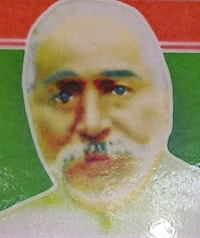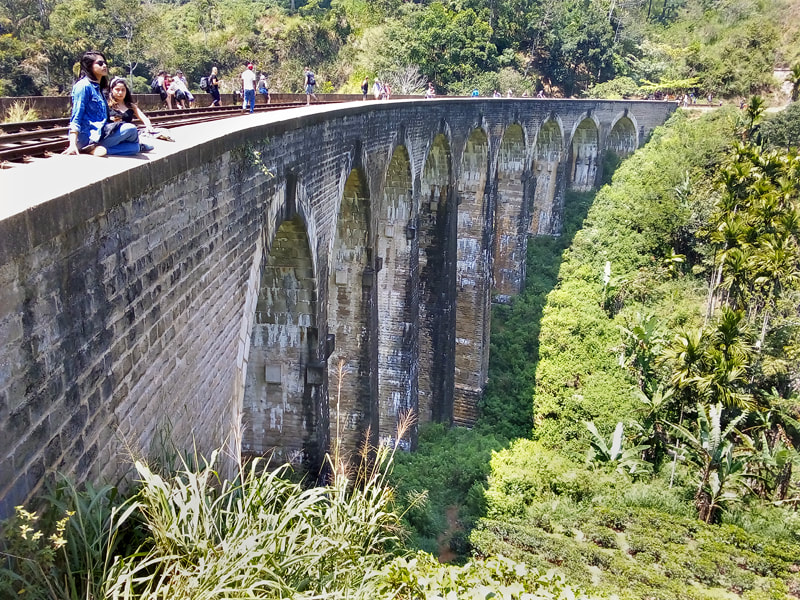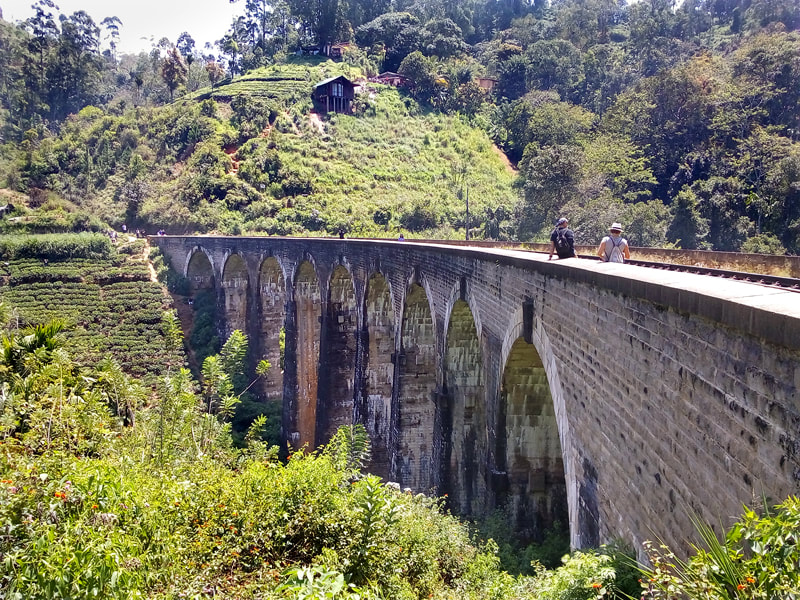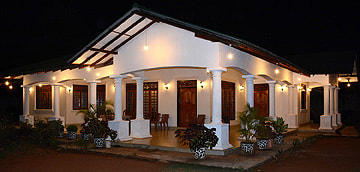|
Situated at an elevation of 950 m above sea level, Nine Arches Bridge at Gotuwala near Demodara in the Uva highlands has become a popular hiking destination for holiday makers who stay in the nearby hill resort of Ella. Another English nickname of and viaduct ist ‚bridge in the sky‘. The Sinhalese name however translates to ‚Nine Skies Bridge‘, referring to the visual effect that one can see the sky nine times through the arches when standing below the bridge. Ten trains cross Nine Arches Bridge daily. Cafes with vantage points can be visited on either side of the bridge. With a height of 24.5 m and a total length of 91.4 m, this viaduct built during the British Colonial period and commsioned in 1921 is still the largest railway bridge in Sri Lanka. This massive bridge is built entirely of solid rocks, stone, bricks and cement. There is not used any steel for ist construction. One popular story explains this by claiming that when construction work was already started, World War I broke-out and that steel assigned for the viaduct was required for other projects. The construction work came to a halt. Hence the locals decided to build the viaduct in a different way without a single element of steel.  P.K. Appuhami, Sinhalese co-engineer of Nine Arches Bridge P.K. Appuhami, Sinhalese co-engineer of Nine Arches Bridge P.K. Appuhami, born in 1870, had been popular drummer and dancer. When he lost a competition during a devil dance ceremony, he returned home in his traditional devil costume. The British construction workers at the brisge seeing him got frightened, but later on hired him as a labourer, who in the course of time turned out to be a talented engineer. Apuhami asked the British to hand over the difficult task of anchoring the bridge piers at the bottom of the boggy bottom. After being rejected for this task, Apuhami finally was entrusted with this engineering work. Starting in 1923, Apuhami mangaed to completed this work within a year. But the cost of the construction had turned out to be so low that the British railway enginieers doubted the structural integrity of the construction. Appuhami then lied down under one of the arches when the first train crossed the newly erected viaduct, as a prrof of trust in his engineering work.
0 Comments
Leave a Reply. |
AuthorNuwan Chinthaka Gajanayaka, Categories
All
Archives
June 2020
Buddhism A-Z
|
|
Find a list of 270 Sri Lanka travel destinations & attractions: CLICK HERE Our illustrated list of places of interest is sorted by travel regions, more precisely: by 22 most recommendable places for overnight stays. All 270 sights are within day-trip distance from one of those 22 major locations. (Please understand: Loading 270 images requires more seconds than usual.) |
Why travel with Lanka Excursions Holidays?
+ We are a local agency owned and run by Sri Lankans, not part of international holdings
+ We are well known for our direct and personal relationships with travellers
+ We facilitate authentic meetings with locals who are not from the tourism sector
+ We follow a strict policy not to push guests to visit shops and shops and shops
+ We have an unrivalled expertise to show you places off the beaten path
+ We provide genuine information instead of clichés and tourism industry slogans
+ We are a local agency owned and run by Sri Lankans, not part of international holdings
+ We are well known for our direct and personal relationships with travellers
+ We facilitate authentic meetings with locals who are not from the tourism sector
+ We follow a strict policy not to push guests to visit shops and shops and shops
+ We have an unrivalled expertise to show you places off the beaten path
+ We provide genuine information instead of clichés and tourism industry slogans
Our ambition is to provide high-quality information in preparation of your Sri Lanka holidays
... and even more superb travel experiences
... and even more superb travel experiences
we also run our own guesthouse near Anuradhapura:
First House Mihintale
87, Missaka Mawatha, Mihintale 50300, Sri Lanka.
0094 71 6097795
87, Missaka Mawatha, Mihintale 50300, Sri Lanka.
0094 71 6097795
|
Lanka Excursions Holidays
Registration Number SLTDA/SQA/TA/02179
255/24, "Green Park" Dawatagahawatta, Thimbirigaskatuwa, Mahahunupitiya East, Negombo, Sri Lanka
Office: +94 31 223 991 Hotline: +94 71 6097795 [email protected] Lanka Excursions Holidays office hours 8.00 to 6.00 p.m. daily (except from June Fullmoon Day)
|
if not stated otherwise, texts and photos provided by Ernst A. Sundermann, sales manager of Lanka Excursions Holidays
all rights reserved, © 2016 Lanka Excursion Holidays
all rights reserved, © 2016 Lanka Excursion Holidays


 RSS Feed
RSS Feed



